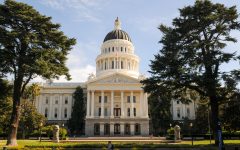
California State Capitol. (Photo: Kevin Sanders for California Globe)
Hearing Procedures for Unemployment Compensation in California
Prohibits any cost from being awarded in hearings on appeal by the Appeals Board
By Chris Micheli, November 12, 2024 2:30 am
In Division1, Part 1, Chapter 8 of the California Unemployment Insurance Code, there are procedures for hearings. Section 1951 provides the manner in which disputed claims, appeals and petitions are to be presented, the reports required from the claimant and from any employing unit and the conduct of hearings and appeals must be in accordance with rules prescribed by the appeals board.
In addition, the appeals board must require administrative law judges to consolidate for hearing cases with respect to which the alleged facts and the points of law are the same. The appeals board has to permit a party or representative to participate in a hearing by telephone upon the party’s or representative’s request and showing a good cause, in accordance with regulations adopted by the board.
Section 1952 specifies that the appeals board and its representatives and administrative law judges are not bound by common law or statutory rules of evidence or by technical or formal rules of procedure but may conduct the hearings and appeals in the manner as to ascertain the substantial rights of the parties.
A full and complete record will be kept of all proceedings in connection with disputed claims. All testimony at any hearing held in this state upon a disputed claim arising under this division must be recorded and, when feasible, by a reporter in shorthand or by machine writing. The testimony need not be transcribed unless the disputed claim is further appealed.
Section 1953 states that, in any proceeding, hearing, investigation or in the discharge of any duties imposed under this division any member of the appeals board, an administrative law judge and any authorized employee designated by it may administer oaths, take depositions, certify to official acts and issue subpoenas to compel the attendance of witnesses and the production of books, papers, correspondence, memoranda and other records.
Section 1953.5 allows the presiding officer may conduct all or part of a hearing by telephone, television, or other electronic means, notwithstanding a party’s objection, on a showing of good cause by the party requesting the hearing by telephone, television, or other electronic means.
Section 1954 provides that obedience to subpoenas issued in accordance with this chapter may be enforced by application to the superior court.
Section 1955 explains that no person is excused from attending and testifying or from producing books, papers, correspondence, memoranda and other records as required by a subpoena issued pursuant to this chapter on the ground that the testimony or evidence, documentary or otherwise, required of him may tend to incriminate him or subject him to a penalty or forfeiture.
No individual is to be prosecuted or subjected to any penalty or forfeiture for or on account of any transaction, matter, or thing concerning which he is compelled, after having claimed his privilege against self-incrimination, to testify or produce evidence, documentary or otherwise.
Section 1956 allows witnesses subpoenaed to be allowed the same fees relative to proceedings in the superior court. Fees and all expenses incurred in any proceeding, hearing, review or investigation by the director or the Appeals Board or the representative of either, except charges for services by counsel or other agent representing claimant, employer, or other interested person, must be part of the expenses of administering this division, and no individual claiming benefits is to be charged by the Appeals Board, or its representative, fees of any kind in any procedure under this division.
Section 1957 states that any individual claiming benefits in any proceedings before the appeals board or its authorized representative may be represented by counsel or agent but no the counsel or agent cam charge or receive for the services more than an amount approved by the appeals board. Any person who violates any provision of this section is for each the violation be fined not less than $50 nor more than $1,000 or be imprisoned not more than six months or both.
Section 1957.5 requires the department to make available without charge printed forms for the use of any individual claiming benefits to authorize counsel or an agent to represent him in any proceedings before the appeals board or its administrative law judges or authorized representatives.
Section 1958 prohibits any cost from being awarded in hearings on appeal by the Appeals Board, but if in the opinion of the Appeals Board, the claimant or an employer has acted in bad faith and without reasonable basis for appeal, a penalty not exceeding 10% of the amount finally awarded on the appeal may be taxed against and deducted from the award by the Appeals Board and be placed in the Unemployment Fund.
Section 1959 states that a hearing or proceeding under this division, the appeals board may delegate its power in relation thereto to any deputy, administrative law judge, or other person properly authorized in writing by it.
Section 1960 provides that any finding of fact or law, judgment, conclusion, or final order made by a hearing officer, administrative law judge, or any person with the authority to make findings of fact or law in any action or proceeding before the appeals board, cannot be conclusive or binding in any separate or subsequent action or proceeding, and not be used as evidence in any separate or subsequent action or proceeding, between an individual and his or her present or prior employer brought before an arbitrator, court, or board.
- Proration of Estate Taxes - February 28, 2026
- Corporations Commissioner Powers - February 27, 2026
- Death Deeds in California - February 27, 2026



